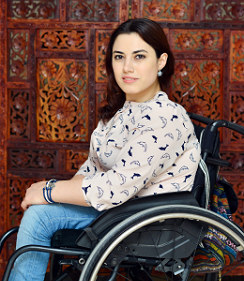Expert’s take: “Neither men, nor women should be objectified by advertising”
Date:
About the author

Elena Ratoi is the Manager for the UN Women component of the “Women in Politics” UN Programme. She joined UN Women team in Moldova in 2014 to work on advancing women`s political participation in politics and decision-making processes. Prior to UN Women, she was working as a project assistant for Association “MOTIVATIE” and was engaged in actively defending the rights of people with disabilities. She holds a Master`s degree in Civil Law from Moldova State University.
I remember the morning when I received an aggressive message on social media. It was a comment to an article that I shared about several Moldovan companies being sanctioned for the first time for using sexist images and text in their advertising. I was part of the group that complained against those companies. “Such kind of actions are initiated by ugly, old women that cannot attract men`s attention,” was one of the comments. “Who disappointed you so badly that you are so against men?” was another. Maybe a few years ago, I would have had a similar view.
I got acquainted with the topic of sexism, particularly sexism in advertising, when I started working for UN Women. One of the areas of intervention of the “Women in Politics” Programme, implemented jointly by UN Women and UNDP and two non-governmental organizations, was to provide support to the Ministry of Labour, Social Protection and Family in defining and promoting the adoption of legal provisions on sexist advertising. Back in 2014, there weren’t any regulations related to sexist advertising and the notion of sexism was new for the country.
In 2015 and 2016, we organized many initiatives to combat sexist advertising. Our focus was split in two main directions. We worked with various target groups, including representatives of advertising agencies, people who oversee the productions of commercial ads, public officials working in the field of advertising, and gender experts to raise their understanding of sexism in advertising. We also conducted an analysis of policies and regulations, including international practices.
In April 2016, Moldova achieved a significant breakthrough by adopting Law no. 71 on amending and finalizing several legislative acts, which modified 15 laws. The Law introduced, for the first time, a fine for companies which use sexist advertising to promote their goods and/or services. The Law also makes it an obligation for such companies to remove their adds. The passing of this law was a joint effort by the civil society, gender equality experts, UN agencies, Ministries and Members of Parliament.
UN Women’s work on sexist advertising was built on newly adopted legal provisions. In 2016, we conducted four capacity building initiatives for stakeholders; including PR and Communications companies and advertising agencies who could be subject to the Law and representatives from Ministries and public institutions who are responsible for the implementation of the Law. As a result, 16 advertising and Public Relations companies from Moldova signed a commitment to respect the newly adopted legal provisions and avoid sexism in their work. Also, in partnership with the Association of Advertising Agencies from Moldova, we produced a guide to assess sexism in advertising, aiming to help companies to identify whether an advertising is sexist or not.
During the implementation of these initiatives, representatives of advertising and communications agencies asked why we were so focused on advertising. Many believed that we should care more about the content of movies and video clips. And many people said that sexism in advertising is not very common in Moldova.
But a personal experience made me think differently. A friend of mine told me that her 3-year-old nephew questioned a socks ad for showing bare men legs. “Only women should be undressed,” he said. Both of us were shocked, especially because we knew that nobody spoke to him before about women on commercials. This was a conclusion reached by a toddler based on what he sees on TV, newspapers and magazines.
Sexism has an influence on the attitudes and minds of people, including children. The education we receive, the media we consume, including advertising where women are treated like objects, have an influence on how we turn out as adults. In such advertising, women become so called “men’s accessories,” where they should be undressed, voiceless, in the kitchen or doing domestic work. Promotion of violent sexism is one of the causes of violence.
Now I pay more attention to ads and I discover, daily, sexism and stereotypes, including promotion of gender roles. I even have a collection of sexist ads, which now has over 60 sexist ads from Moldova and abroad, identified by me or sent to me by various people. Through my personal Facebook account, I try to inform public opinion about sexism and help people understand what sexist advertising is by showcasing concrete examples. To carry my work one step further, together with 4 friends, I submitted a complaint to the Council for Preventing and Eliminating Discrimination and Ensuring Equality, which is an independent public body that aims to prevent and protect against discrimination, ensure equality and promote equal opportunities and diversity. It has a responsibility to determine and fine companies that promote sexist advertising. As a result, the Council decided to sanction 14 companies that used sexism in their ads.
Meanwhile, I received another online message: “Would you be pleased if there were naked men in advertising?” No, I would not. Neither men, nor women should be objectified by advertising. Both women and men should be portrayed in a way that their dignity, reputation and image is respected.
But changes in development are generally denounced by the society in the beginning. I understand that we still have a long way to go to have a society where women`s dignity and rights are fully respected.